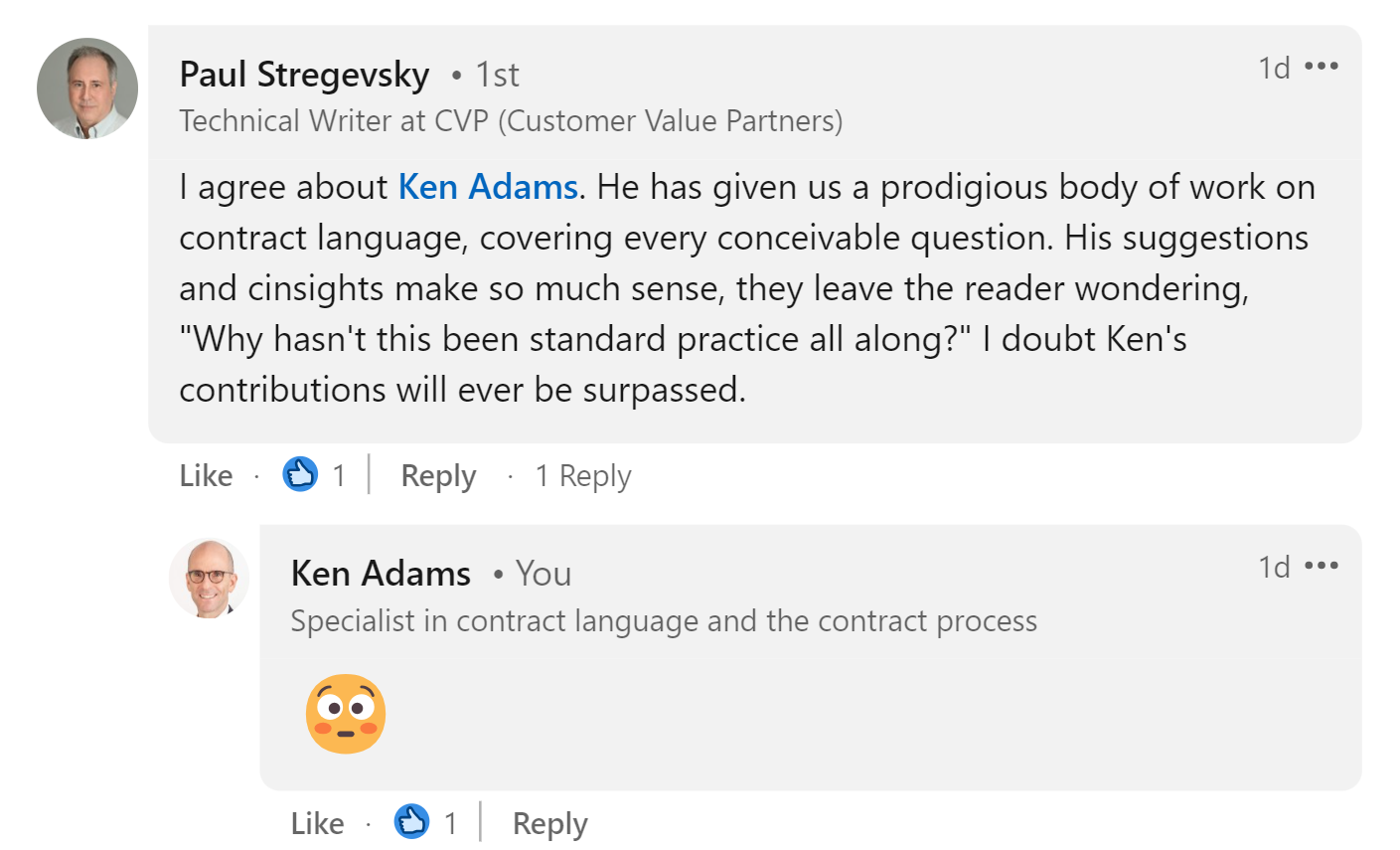
I know people find what I do worthwhile. Some individuals and organizations buy copies of MSCD. Others pay for the training I provide. And sporadically, people make a point of saying they find MSCD valuable, find my training worthwhile; I pass some of that feedback along to you all. That’s all to the good, but there’s no need to make a big deal of it.
But what Paul Stregevsky recently said in this comment on LinkedIn (his comment is shown in the image accompanying this post) is a little different, so I permit myself to take a closer look. (Paul’s comment is to a post by Brendan Kenny, who saw fit to include me in his list of “LinkedIn best of Law & Tech 2023.”)
What Paul said is broader in scope than the feedback I usually get. I think that’s because Paul doesn’t work with contracts. He’s a technical writer, so he brings a fresh pair of eyes to the world of contracts, and a perspective that isn’t entirely utilitarian. It might also help that he hasn’t been on the receiving end of my polemic, and he won’t feel targeted by my harping on about the dysfunction of mainstream contract drafting. In any event, the result is that, concisely and eloquently, Paul has been able to get to the heart of what I do.
Regarding his first sentence (“prodigious body of work”), I won’t argue with that, if you take “contract language” to refer to the building blocks of contract language—the words and phrases I tackle in MSCD. It’s amazing what you can build over 20+ years of incremental work.
His second sentence gets to the simple dynamic underlying my process. In analyzing a given issue, I submerge myself in pulling together the various threads (caselaw, deal mechanics, semantics, linguistics—whatever). That’s the hard part. I then present you with a choice: do the dumb, arcane traditional thing, or opt for a straightforward, modern alternative. For those with a sense of agency—control over their actions—that’s an easy choice. (In a copy-and-paste world, a sense of agency is a precious commodity.)
Regarding the odds of my work ever being surpassed, I suspect that Paul is right. For one thing, when I address a given issue, generally I do so comprehensively, and generally I get it right (after fixing mistakes). That doesn’t leave a lot of room for others.
But the bigger issue is that I’ve seen no sign that anyone else has any interest in, or aptitude for, emulating my approach to contract language. The traditional approach is legalistic—it treats contract language as determined by caselaw or the prevailing practice. By contrast, I look at what’s required for contract language to accomplish a given goal, and I make any necessary changes, even if that means breaking with tradition.
It would be too bad if no one takes up the torch. MSCD does comprehensively address the building blocks of contract language, but the vast field of contract substance would benefit from the same approach. For example, see how I’ve worked to put boilerplate on a more sensible footing. (My materials on boilerplate are listed here, and my customizable boilerplate provisions are available in the Adams Contracts boilerplate template.) And I’ve been able to challenge some standard approaches to M&A drafting. (See the first three blog posts listed here.)
The only way that sort of work will get done is if one can make money doing it. That’s what I’m trying to do with Adams Contracts. It’s the only initiative that aims to offer broad change in how we express different kinds of transactions.
In any event, that’s what Paul’s comment brought to mind.

He’s not wrong!!